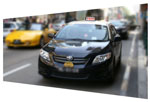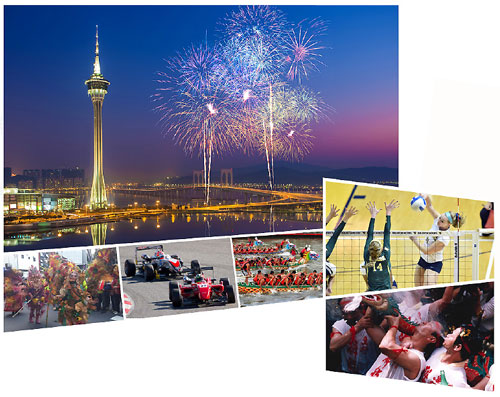

Macao is an international city located on the southeast coast of China. Since the middle of the 16th century, Macao has been a melting pot of Eastern and Western cultures. The Macao Special Administrative Region of the People's Republic of China was founded on December 20, 1999. Under China's "One Country Two Systems" policy, Macao maintains a high level of autonomy, including rights to its own administration and legislation, independent judicial system, and final judgment, while maintaining its unique social and economic characteristics.
Macao's economy has developed rapidly in recent years. The SAR government has adopted the "1+4" moderately diversified development strategy to promote the development of comprehensive tourism and leisure industries, the key industries such as comprehensive health, modern finance, high-tech industries, convention and exhibition trade, culture and sports. In addition, eastern and western cultures have coexisted in Macao for more than 400 years, leaving Macao with rich cultural deposits, historical and cultural heritages. The uniqueness of Macao was successfully inscribed on the UNESCO’s World Heritage List and Memory of the World Register in 2005 and 2017 respectively. Macao was also designated as UNESCO's Creative City of Gastronomy. This allows Macao to further showcase its unique historical and cultural features, rich and diverse connotations.
Even though Macao is a relatively small city, thanks to the rapid speed of economic development, the quality of life has continuously improved. According to a report by ECA International, Macao was named the 19th most livable city in Asia, taking into account factors such as climate, health care service, housing and related facilities, etc.

Macao is located at the southern tip of the Pearl River Delta, on the coast of southeastern China (longitude 113°37’, latitude 22°04’), 60 kilometers away from Hong Kong. Macao's territory includes the Macao Peninsula, as well as Taipa and Coloane Islands -- covering a total of around 30.4 square kilometers.
Macao is in a monsoon region: its summers are hot and wet, its autumns are sunny and cool, its winters are slightly cold and rainy. From June until September, its outdoor temperature can exceed 30 degrees Celsius; from December to November, it can fall below 10 degrees Celsius. Its average temperature is around 22.7 degrees Celsius, with the hottest weather in July and the coldest in January. In addition, during summer, Macao can be affected by tropical storms (typhoons) originating from the southern Pacific Ocean.
According to statistics in the second quarter of 2023, Macao has a population of around 680,000. The residents are mainly Chinese, but also include Portuguese and other nationalities.
Aside from using Chinese, Macao's government also uses Portuguese. Locals generally speak Cantonese, and many can also communicate in Putonghua. English is widely understood in Macao, and can be spoken in many situations. As Macao strengthens its ties with mainland China and the rest of the world, more and more locals are using Putonghua and English to communicate.
Since industrial emissions are low, the overall air quality is good. In the year 2022, the air quality in densely populated residential areas achieved a normal to good level. The average concentration of various pollutants was low and met various standards.
Macao, like most international cities, has high-quality, clean tap water produced by a local water company. Most of Macao's tap water comes from mainland China, and is filtered, sterilized, and chlorinated as it enters the city. Even though the tap water has undergone purification and cleaning, it is still recommended to boil it before consumption to further sanitize it.
The standard electricity voltage in Macao is 230 V and the standard frequency is 50 Hz. Power outlets generally take square or round three-prong plugs.

By Air: |
The Macau International Airport is located on Taipa, only 15 minutes away from the Outer Harbor Ferry Terminal via car. It is only 20 minutes away from the border gate (crossing to Zhuhai) and 10 minutes away from the Cotai border checkpoint. The airport operates 24 hours a day. |
By Sea: |
Outer Harbour Ferry Terminal on the Macao peninsula and Taipa Ferry Terminal on the outlying island provide 24-hour maritime passenger transportation to and from the urban areas of Hong Kong and Hong Kong International Airport respectively. In addition, they provide service to the three corners of the Pearl River Delta in China's Guangdong province, including Nansha, as well as Shenzhen's Shekou and Fuyong docks. |
By Land: |
People can travel from Macao to mainland China by road through several border checkpoints such as Border Gate, Qingmao and Hengqin. Among them, Border Gate is open from 6 am to 1 am of the following day; Qingmao and Hengqin are open 24 hours a day. |

Public Buses:
Macao's three bus companies provide large and small bus services throughout Macao, Taipa, and Coloane. Every bus stop contains Chinese and Portuguese bus route information, describing the locations at which each bus stops. Students can buy a special "Macau Pass" card (rechargeable card) from specially marked locations to ride the buses for a discounted ticket price.
Taxis:
Taxis in Macao have a black body with a cream-colored top. Taxi fares are standardized by the government and passengers should pay according to the meter installed in each car. Starting from April 1, 2017, On-call Taxi are available, and can be booked via telephone, mobile app, or online portal.
Taxi Fares (MOP) |
|
First 1,600 meters |
19.00 |
Every 240 meters after |
2.00 |
Macao is currently constructing a light rail network that, when completed, will make inner-city travel even more convenient.

The local currency is Pataca. Shops in some tourist areas also accept Hong Kong Dollar (HKD), Renminbi (RMB) and other common foreign currencies. Visitors and residents can freely exchange foreign currencies in the bank or money-changer.
Outward communication is very easy in Macao. Its telecommunications networks have full coverage in the city, providing stable and reliable mobile internet service. Consumers are free to choose which telecommunications provider best suits their needs.
Across Macao, there are 560 locations (including public facilities, government venues, and tourist attractions) that provide convenient, free WiFi internet service. In addition, fibre broadband service is common in Macao.
Macao is a very safe and secure city. Its police department and reporting center provide round-the-clock services. If you are in an emergency situation and need police assistance, dial 999, 993, 110, or 112 for help.
In 2004, Macao was named one of the WHO's “healthy cities”, and became a founding member of the “Alliance for Healthy Cities”.
The health care system in Macao is considered relativity well-developed. Non-local students who seek medical care in a public hospital will need to pay for the treatment. Finding a private doctor is also easy, and the fee is usually around MOP100-200 per visit. In order to ensure that non-local students have medical support, schools in Macao provide medical insurance for students, with an annual fee starting at MOP120.
Macao's higher education institutions usually provide new students with student dormitory facilities. Some schools may also have policies requiring first year students to live in their on-campus dormitories. The accommodation cost for these facilities differs between schools, and can vary from MOP12,000+ to MOP30,000+ per academic year.
Thanks to Macao's hundreds of years of eastern and western culinary traditions, countless types of Chinese, Portuguese, and other authentic, international cuisine can be found both in the city's small alleyways and wide boulevards. Some schools provide on-campus cafeterias for students and staff. The cost for a meal in these cafeterias is usually cheaper than elsewhere in the city. A person's living costs depend greatly on how much one is willing to spend: a student should expect to spend anywhere from MOP25,000 to MOP45,000 a year.
What is spending like in Macao? Here are some example prices for goods and services in Macao (for reference):
Item |
Price for Reference (in MOP) |
|
McDonald's Value Meal |
30 – 40 |
|
One can (330 ml) of Coca Cola (from convenience store) |
7 |
|
One lunch meal at an dinning establishment (including main dish, rice, and soup) |
40 – 60 |
|
One lunch meal at a school cafeteria |
35 – 45 |
|
One movie ticket |
50 – 120 |
|
One taxi ride (starting price) |
19 |
|
|
One bus ride : |
6 |
Using Macau Pass:3 |
(USD100 = about MOP810)
Macao is a melting pot of eastern and western cultures. In addition to festive occasions, Macao hosts a number of large-scale international events every year, some of which include:
Month |
Holiday and Event |
January to February |
Chinese New Year, joyous Chinese New Year celebrations, Chinese New Year Night Parade |
March |
Procession of the Passion of Our Lord, the God Jesus |
|
May |
Procession of Our Lady of Fátima, Feast of Buddha, Feast of the Drunken Dragon, Tam Kong Festival, Macao Arts Festival |
June |
Macao Lotus Flower Festival, Feast of Na Tcha, Macao International Dragon Boat Races |
July |
FIVB Volleyball World Grand Prix Macao |
October |
National Day of the Peoples Republic of China, Mid-Autumn Festival, Macao International Music Festival, Macao International Fireworks Display Contest |
November |
Macao Grand Prix, Macao Food Festival |
December |
Macao International Parade; Macao International Film Festival and Awards, Macao Special Administrative Region Establishment Day |
Note: The above schedule is for reference purpose only; the exact dates are announced every year.
There are 16 public libraries in Macao, as well as around 20 government and privately-operated museums. Macao also hosts a wide variety of exhibitions. The city's many sport or recreational facilities often run low-priced and free events for the public, enriching everyone's leisure life.
